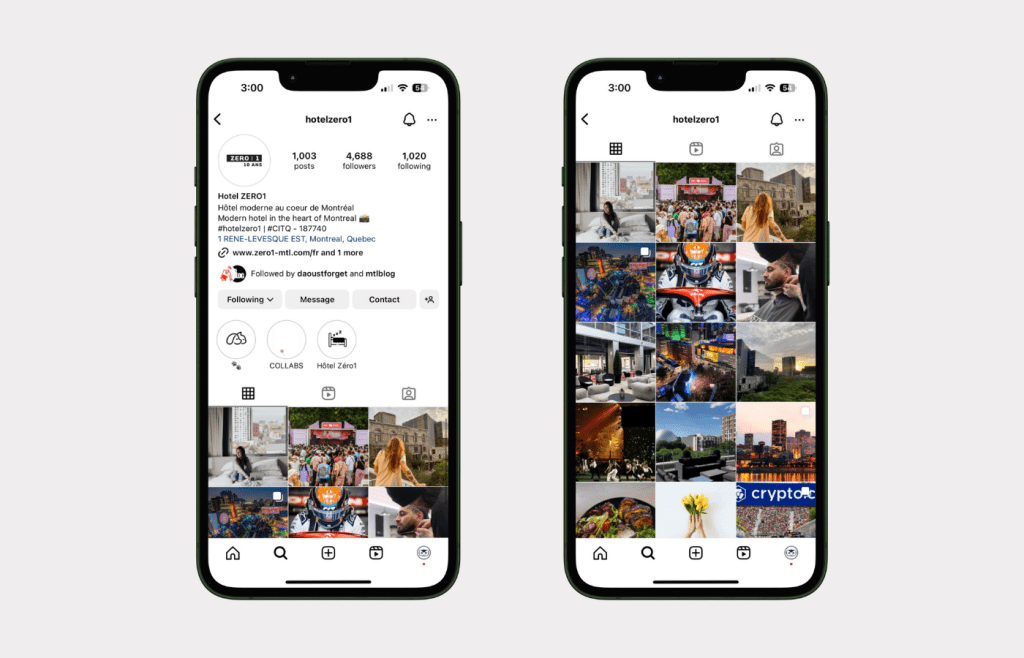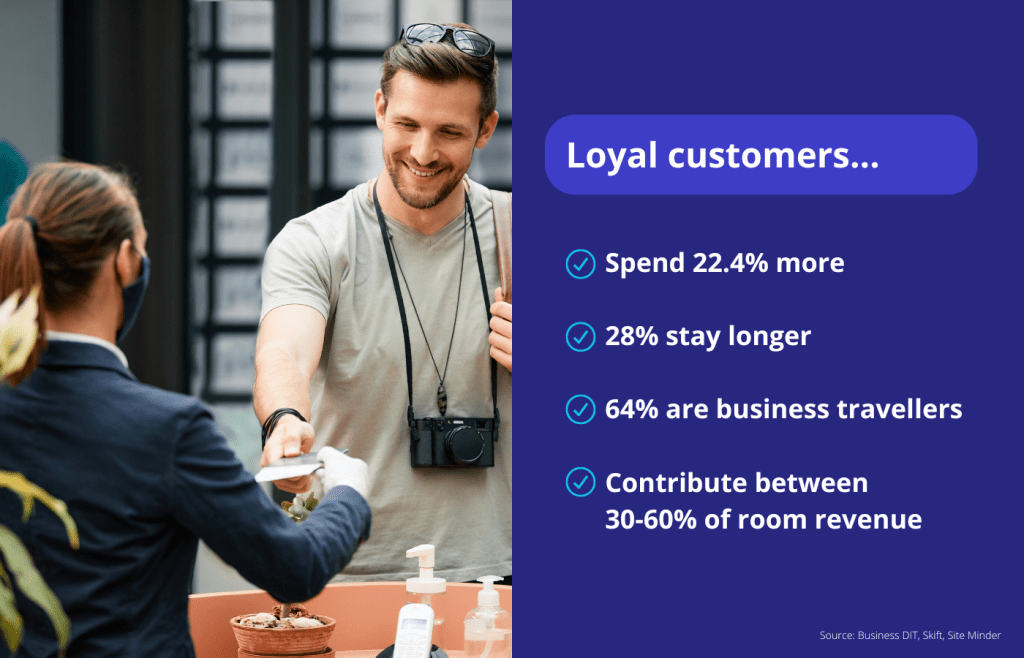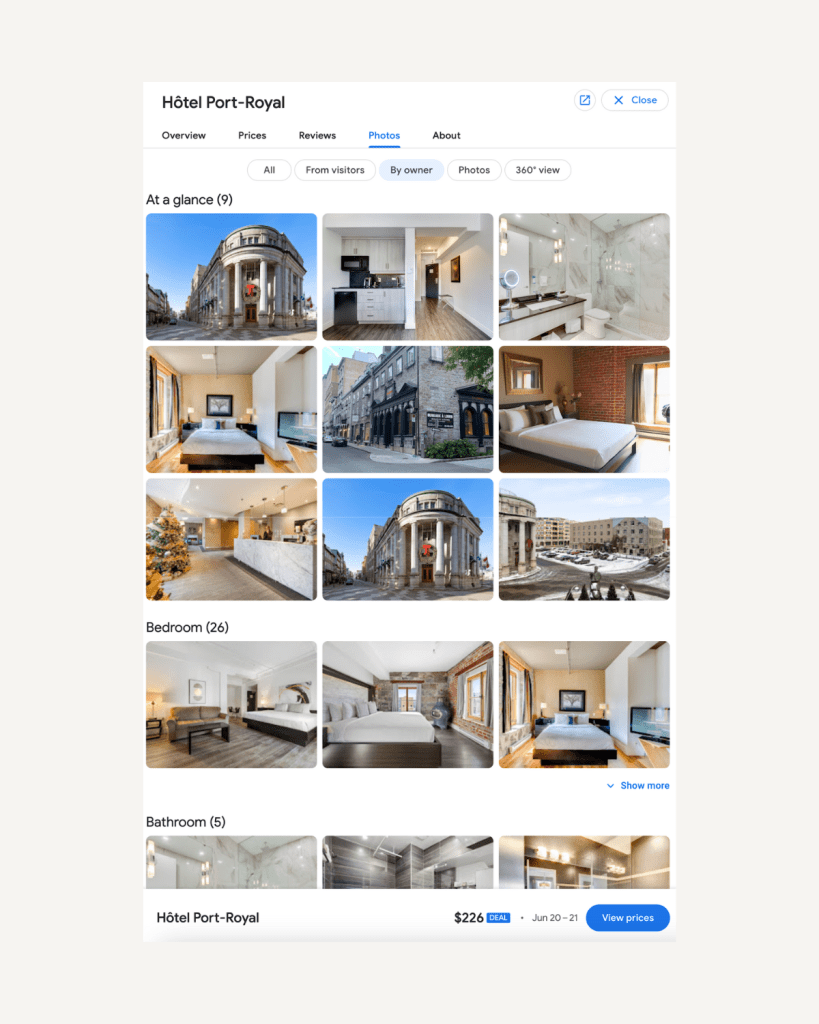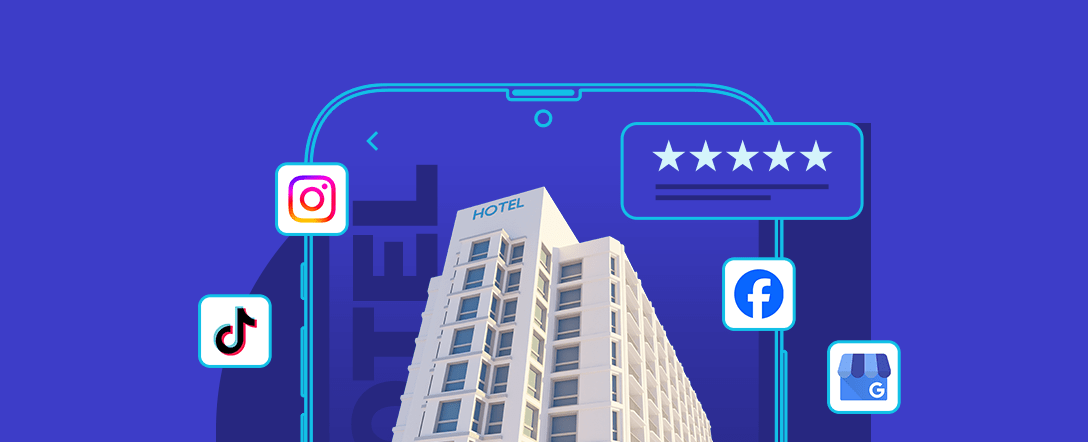As the Hospitality and Tourism industry grows and gets more competitive, there’s an estimate online sales will generate 80% of total revenue in the next 3 years. Therefore, hotels and hostels must work on increasing their online presence and loyalty.
It is essential to optimize your digital marketing strategy to build engagement with potential guests and increase occupancy rates. Learn some of the strategies you can apply to your business to start seeing the results before peak season.
Don’t feel like reading? Watch the video version below.
Marketing strategies for hotels
1. Optimize Your Website for Conversions
Your website is often the first point of contact potential guests have with your brand. So you have to keep it up to date and optimized for conversion. This is more than having a nice-looking website:
Mobile Optimization
With 35% of bookings coming from mobile devices, ensure your website looks and functions well on smartphones and tablets. If a potential guest is exploring your site on their phone and finds it hard to navigate, they might leave and book elsewhere. A responsive design will help you retain visitors and convert them into bookings.
High-Quality Visuals
Imagine a traveller deciding between two hotels; one has blurry, outdated photos, and the other has vibrant, clear images of spacious rooms and amenities. They’re likely to choose the latter.
High-quality visuals make a significant difference in showcasing the value of your property. Use them to highlight what sets you apart, according to your audience. Yes, you might have the best dining experience in the area, nevertheless, is that what past guests share on the reviews and what makes them come back?
A great example of this is what the Fairmont Le Château Frontenac does. This iconic hotel is a landmark in Quebec City, known for its history and architecture. Therefore, a photo of their building front and center on their website.

Another great example is how Manoir Hovey is promoting their facilities. Their visuals and copy help the potential guests see what their experience will look like.

Clear CTAs
Your calls to action (CTAs) must be clear and easy to find on your website. They will guide users towards booking. You can do it in many ways but remember to use a verb (book, reserve, check, click…) to entice people to take action. Using CTAs is common practice and you will use it often in your digital marketing strategy.
Here are some of the CTAs you can use on your website:
- Book Now
- Check Availability
- Reserve Your Stay
- Book Your Next Holiday
- Reserve Your Spa Day
- Book a Room
- Book Your Dream Vacation
User-Friendly Navigation
Make it easy for visitors to find information and make bookings. Use straightforward menus and logical page layouts.
The navigation can be simplified by having a Rooms & Rates section where guests can quickly compare options and prices. The goal is to streamline their decision-making process. Also, having a site map or search bar can help users quickly find specific information.
2. Use Reviews and Testimonials
Reviews and testimonials play a crucial role in hospitality marketing. 40% of hotel guests will leave a review when they have a positive experience. The number goes up to 48% for those who had a negative experience.
Encourage satisfied guests to leave positive reviews on platforms like TripAdvisor, Google, and Yelp. You can reuse those reviews on your website and social media channels to build trust and credibility with new potential guests.
At the end of the day, reviews can significantly influence potential guests to choose your hotel or hostel over competitors.
Another key aspect of reviews is to respond to them, positive or negative. Thank guests for their feedback and address any concerns raised in negative reviews. This shows potential guests that you value their input and are committed to improving.
3. Harness the Power of Email Marketing
Email marketing offers a direct line of communication with guests and potential guests, allowing you to promote deals, share updates, and build lasting relationships. Despite its effectiveness, many in the hospitality industry underuse this powerful tool.
You can use email solutions like Cyberimpact to create separate lists for your potential guests, loyal guests, brand ambassadors and more. Also, plan automated email sequences to save you time and an interesting pre and post-stay experience. This is a great way to increase bookings by cultivating the relationship you have with previous guests.
Now, you can integrate your Cyberimpact account with some of the best booking and hotel management apps available today, like LoungeUp, Reservit, and Mews.
Here are some example of emails you can send to guests to increase guest loyalty:
Confirmation Emails
When a guest books a room, an immediate confirmation email detailing their stay is crucial. This email should include check-in and check-out dates, room type, and any special requests. Use this opportunity to upsell additional services like spa treatments or airport transfers.
Pre-Arrival Emails
Pre-arrival emails sent a few days before check-in, enhance anticipation and satisfaction. Provide valuable information such as local attractions, dining recommendations, and hotel amenities.
By offering special deals or upgrades in pre-arrival emails, you can boost revenue; Oaky has found that sending it twelve days before check-in results in the highest CTR of 48% and a conversion rate of 10.6%. That number is nearly double compared to other days.
Post-Stay Emails
After departure, send a thank-you email with a request for feedback. This not only shows appreciation but also provides valuable insights into guest experiences.
This is a great memento to ask guests to leave reviews on your website or other places where travellers research before booking, such as Booking.com, Expedia, Yelp and Google.
Appreciation Emails
Show your loyal guests some love with appreciation emails. Thank them for their patronage and offer exclusive discounts for their next stay. These emails usually have a high open rate and can significantly increase repeat bookings.
4. Leverage Social Media
Social media is a powerhouse for hospitality marketing. One of the reasons is that you can get great earned media and user-generated content (UGC) to promote your hotel.
These pieces of content spread the word about your business organically and can boost your word-of-mouth marketing. To leverage this, have a consistent presence on social media and show some appreciation for users who share their experiences at your hotel.
The Hotel ZERO1 is doing great work on balancing showing their amenities and installations while sharing local events that guests can enjoy when visiting Montreal.

On your social media content, you can share your amenities, local attractions, and room details and generate traffic to your email list. A great rule of thumb is that social media can give you massive exposure and awareness; from there, you must direct people to your channels — either your website or email list.
Use those first touchpoints on social media to engage with people and learn about your audience and guests. When you receive comments or DMs about your hotel — for instance, if a potential guest asks about room availability or amenities —, a quick and helpful response will start building a positive opinion before the booking.
Due to its great reach and exposure, social media is a great place to announce exclusive deals and promotions. You can offer a discount for followers who book directly through a link shared on your social media profile, or who sign up for your email list.
5. Create a Loyalty Program
There is a reason for 94% of the world’s top 100 hotel brands and chains to have a loyalty program – they’re extremely effective in driving revenue. Loyalty programs are an effective way to encourage repeat bookings. And you can start one using a separate email list with your loyalty members.
By offering points, discounts, or exclusive perks to returning guests, you can build brand loyalty and increase direct bookings.

Points-Based Systems
Allow guests to earn points for each stay, which they can redeem for free nights or upgrades. You might offer 10 points for every dollar spent, and 500 points could be redeemed for a free night. This system incentivizes repeat visits and gamifies the process, making it more entertaining. It also makes guests feel rewarded for their loyalty.
Exclusive Discounts
Offer loyalty program members special discounts not available to the public. For instance, members could receive a 10% discount on all bookings or early check-in and late checkout privileges. These perks make guests feel valued and encourage them to choose your property over competitors.
Early Access to Deals
Provide members with early access to sales and promotions, making them feel valued and prioritized. If you’re running a summer promotion, for example, notify your loyalty program members a week before it goes live to the public. This exclusive access can drive early bookings and increase member satisfaction.
By effectively promoting your loyalty program through email campaigns, social media, and your website, you can attract more guests to sign up and enjoy the benefits, fostering long-term loyalty and boosting direct bookings.
6. Focus on SEO and Content Marketing
Search engine optimization (SEO) is crucial for improving your hotel’s online visibility and attracting more guests online. A lot of people will start their search for a hotel by Googling “hotel at [location]”. With a good SEO strategy, you can be on the top results when they do that.
Use the right keywords
Use keywords such as “luxury hotel in [City]” or “best hotel deals” in your content. Use tools like Google Keyword Planner to find relevant keywords with high search volumes.
If your hotel is in Miami, target keywords like “beachfront hotel in Miami” or “Miami hotel deals.” could be among the most searched and will drive traffic to your website. Remember that people research differently. Some people might research “hotel deals in Miami” and others use “budget-friendly hotels in Miami”.
Local SEO
Optimize for local search by including your location in keywords and creating Google My Business listings. Ensure your business name, address, and phone number are consistent across all platforms.
The Hotel Port-Royal profile on Google My Business is a great example of this. All of their contact info is linked on their profile, and they have gone the extra mile and added high-quality photos of the hotel, the bedrooms, bathrooms, amenities, and surrounding areas.

Local SEO helps you attract guests looking for accommodations in specific areas. Having a complete and accurate Google My Business listing with positive reviews can significantly boost your visibility in local searches.
7. Invest in Paid Advertising
Paid advertising can significantly boost your hotel’s visibility and stand out on search engines and social media. Here are a few options:
Google Ads
Use Google Ads to target potential guests searching for hotels in your area. Bidding on relevant keywords can place your hotel at the top of search results.
Social Media Ads
Platforms like Facebook and Instagram offer highly targeted advertising options. Use these platforms to showcase special offers, events, and unique features of your hotel or hostel.
Retargeting Campaigns
Retargeting ads can help you reach users who have previously visited your website but didn’t make a booking. These ads remind them of your hotel and can offer incentives to book directly.
Conclusion on Hospitality Marketing
Implementing these seven marketing strategies can significantly increase your hotel’s or hostel’s bookings and occupancy rates. Email marketing, with its direct and personalized approach, stands out as a particularly effective tool that is often underused.
By optimizing your website, leveraging social media, implementing loyalty programs, focusing on SEO and content marketing, investing in paid advertising, and utilizing reviews and testimonials, your property can attract more guests and boost revenue.
The key to successful hospitality marketing lies in understanding your guests’ needs and consistently delivering exceptional experiences.
